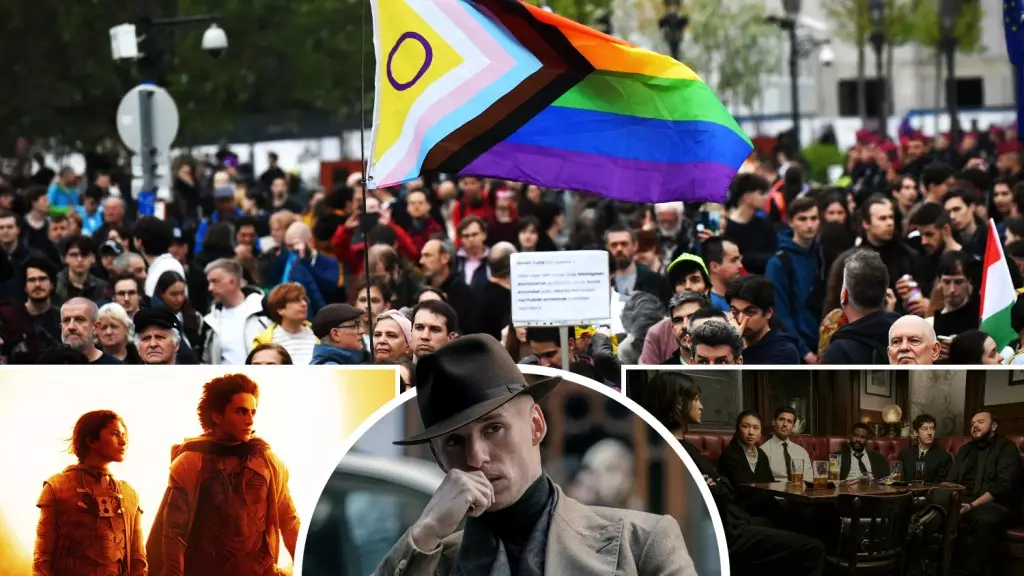As society evolves, so too does our expectation of moral responsibility, particularly from influential industries such as Hollywood. The entertainment sector has long held a significant role in championing social causes, yet recent events bring to light a troubling trend. With Hungary becoming an increasingly popular filming destination even amid escalating anti-LGBTQ legislation, one must question whether studios will continue to prioritize profit over principle. This article dissects this pressing issue, analyzing the delicate balance between financial incentives and ethical commitments.
The Rising Tide of Anti-LGBTQ Sentiment in Hungary
Hungary has recently taken drastic measures that undermine the rights of LGBTQ individuals, evidenced by the passing of constitutional amendments that tightly restrict public demonstrations and expressions of identity. The government’s actions have sparked considerable backlash from civic groups and ongoing protests. The populist regime led by Prime Minister Viktor Orbán has undermined the social fabric of tolerance and acceptance, reinforcing a narrative that marginalizes sexual minorities. With legislation explicitly targeting LGBTQ rights gaining traction, the question looms whether Hollywood’s silence is complicity or simply a calculated decision shaped by economic considerations.
Hollywood’s Complicated History of Boycotts
In years past, the entertainment industry has not shied away from taking a stand against social injustices. The boycott against North Carolina over the notorious “bathroom bill,” HB 2, showcased Hollywood’s potential influence as studios withdrew production, leading to economic ramifications for the state. Interestingly, despite similar violations of human rights unfolding in Hungary, Hollywood’s reaction appears muted at best. Has the industry lost its appetite for activism? As productions such as “Dune: Part Two” and “The Brutalist” continue filming in Hungary, one must question the efficacy of public outcry and whether Hollywood perceives its previous boycotts as catalysts for change.
Economic Motivations vs. Ethical Standards
At the heart of this dilemma lies a lucrative tax incentive scheme that makes Hungary an alluring destination for filmmakers. With a competitive tax credit of approximately 30% and the upfront payment structure, Hungary presents an economically viable alternative to other filming locales. Such financial incentives risk overshadowing any ethical considerations, leading to tough conversations about the responsibilities of capital. Producers may rationalize continued filming as a means of supporting local economies and maintaining relationships with established crews, but what message does it send when they ignore acts of governmental oppression?
A Dangerous Precedent: A Slippery Slope for Filmmakers
Hollywood’s hesitation to respond to Hungary’s deteriorating human rights situation could set a troubling precedent. As the industry grapples with its legacy and influence, ignoring the growing trend of authoritarianism might embolden other nations with similar agendas. Filmmakers must confront a pertinent question: Are economic benefits worth tacitly endorsing human rights violations? A studio’s reluctance to abandon a lucrative production could be interpreted as an implicit endorsement of a regime that perpetuates hate.
Local Impacts and the Human Connection
While Hollywood grapples with its stance, local production teams in Hungary are caught in a precarious situation. Many talented individuals involved in film and television production are left to wonder about their professional futures as Hollywood weighs its economic commitments against moral responsibilities. The apparent inaction from studios affects local industries and communities, highlighting a conflict between profit-driven motives and the well-being of those who depend on these productions for their livelihoods.
The Path Forward: Finding a Middle Ground
For Hollywood, there may be an opportunity to navigate these murky waters by combining economic necessity with ethical responsibility. Studios could embrace proactive measures such as voicing dissent against oppressive laws or engaging in initiatives that support the LGBTQ community in Hungary—be it through funding advocacy groups or employing local talent under fair and inclusive terms. Finding creative solutions allows producers to continue operations without compromising their values, demonstrating that profit and principle can coexist.
Hollywood stands at a crossroads where every decision embodies not just career aspirations but the broader social implications of those choices. As discussion about the moral ramifications of production locations intensifies, it draws attention to the larger role of entertainment in shaping culture and society. The challenge now lies in whether the industry will utilize its platform to champion inclusivity or continue down a path where economic gains overshadow the fundamental rights of individuals.


Leave a Reply